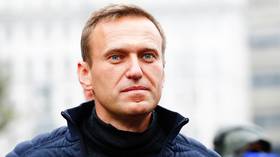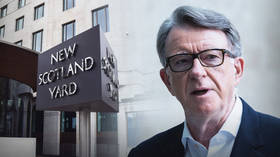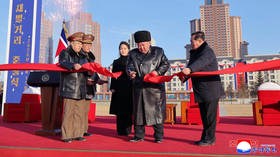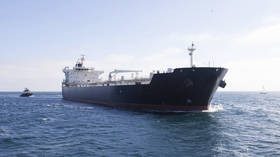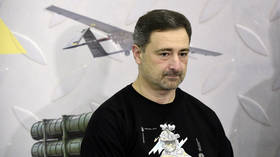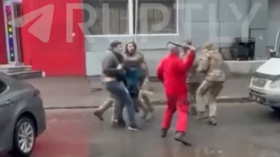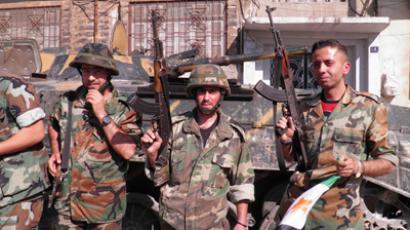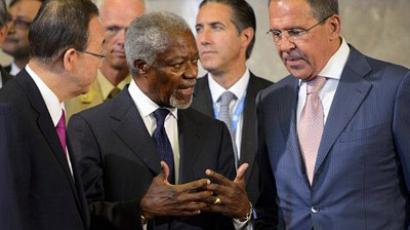Russia and Iran must participate in Syria solution - Annan
Kofi Annan said on Saturday that despite Washington’s harsh rhetoric, there was ‘no alternative’ to Russia’s participation in a diplomatic solution to the Syrian crisis. He also said Iran was ‘an actor that cannot be ignored’.
In an interview with Le Monde on Saturday, UN special Syrian Envoy Kofi Annan said that the “evidence suggests his plans for peace had not yet succeeded”, and that there was “no guarantee” that negotiations would ever be successful.He also, however, stressed that there was no other alternative besides cooperation on a peaceful and diplomatic solution to the crisis.“Have we looked at the other alternatives? Do we have other options on the table? I said this to the UN Security Council, and add that this mission has no definite time frame, just like my own role.”“We did not include a timetable in the plan, because we wanted to emphasize that the process should be conducted by the Syrians themselves.”Annan also addressed the media fixation on the Russian position in the process, while wondering why countries like Iran, who is “an actor” in the situation, were being excluded from the process.“What strikes me is that so many comments are made about Russia, while Iran is least mentioned… The unique focus only on Russia is very irritating to the Russians.”Annan stated that Iran should be involved in the resolution of the crisis, and “cannot be ignored”, while western powers and other Syrian opposition movements have opposed any participation by Iran or Assad’s government in future negotiations for transition.
Competing rhetoric, competing arms shipments
Annan emphasized that western criticism of Russia and China was senseless “competition”, impeding a process which cannot move forward without international consensus. Annan clearly implied that there was "no alternative" to proceeding without Russia.“The Russians, like many other countries implicated in this matter, have interests in Syria and the region. Once we agree in principle that there are also common interests, medium and long term, the question becomes: how can we protect these interests?” Annan stated.Annan also alluded to governments around the world holding olive branches with one hand at the diplomacy table, but handing out aid and weapons to various sides in the Syrian conflict with the other.“Little is known about other countries sending arms, money being spent, and the situation on the ground,” Annan said. “All these countries claim to want a peaceful solution, but they take individual and collective initiatives that undermine the resolutions of the Security Council.”Washington has criticized Russia for selling arms to Assad, taking particular issue with a shipment of refurbished assault helicopters that was set to be delivered to Syria in June. The US, on the other hand, has continued to provide monetary “non-lethal aid” to rebels, which critics say is being used to buy weapons and arm the insurgency.“Shouldn’t the countries [involved] find ways to work together to ensure that Syria does not rip itself apart, not spread problems to its neighbors, and to avoid a situation that creates instability in the region and for the world? Or will these countries continue on the path on which they have embarked, leading to a destructive competition in which everyone will eventually lose?” Annan asked.“More than anything, we must think of the suffering of the Syrians and people of the region. I hope that reason will prevail, at least in regards to the defense of the interests of the concerned states. In this case, it is in the interest of Russia as well as other countries find a way to work together.”
War of words
Meanwhile, Hillary Clinton made headlines on Friday at the friends of Syria meeting in Paris, where she rebuked Russia and China for backing Assad, claiming there would be "a price to pay".“I do not believe that Russia and China are paying any price at all – nothing at all – for standing up on behalf of the Assad regime. The only way that will change is if every nation represented here directly and urgently makes it clear that Russia and China will pay a price,” Clinton warned.Russia has forcefully denied the allegations, saying that such verbal attacks can only escalate an already unstable situation.“We categorically reject that such a question would even be posed regarding the current situation in Syria and Russia’s ‘backing’ of President Bashar Assad.” Russia’s Deputy Foreign Minister Sergey Ryabkov said in response to Clinton’s remarks.“This is not a question of supporting certain political figures or leaders. This is a question of managing a crisis situation in the country within a normal political framework.”
Concessions to Russia?
Clinton’s harsh language came following a summit in Geneva on June 30th, where a resolution was agreed upon by all sides calling for negotiations, with participants in the transitional government to be agreed upon by ‘mutual consent’. While initial reports suggested that all parties present were pleased at the outcome, Clinton’s remarks may have served to undermine that progress by highlighting major differences in the interpretation of the document.Russian Foreign Minister Sergey Lavrov praised the agreements of the communiqué the following Tuesday, saying they represent the best hope for achieving peace in the Arab nation."Geneva gives good chances and they should be used,” the minister stressed. “It is important that all players are pressing actively on all Syrian parties in order to make them stop the violence and get down to the table of negotiations."However, even though there were no overt references stipulating negotiations without Assad in the resolution, Clinton said that no matter what language was used, Assad’s departure was implied, stating that he would never pass a “mutual consent test, given the blood on his hands.”“The Geneva agreements should not be distorted in any way,” Lavrov responded. “They mean just what has been written in the communique, and we will try not to rewrite anything afterwards.""Unfortunately, some representatives of the Syrian opposition began to state that the Geneva decisions are unacceptable for them," the minister said.The Free Syrian Army (FSA), a resistance movement on the ground inside Syria, boycotted a meeting in Cairo in early July where some 250 delegates discussed an internationally backed transition plan following the Geneva summit. The armed rebels branded it a "conspiracy" and said the agenda lacked an aggressive stance.The rebel FSA and some "independent" activists lashed out at the organizers of the two-day conference for “rejecting the idea of a foreign military intervention to save the people… and ignoring the question of buffer zones protected by the international community, humanitarian corridors, an air embargo and the arming of rebel fighters."The boycotters said they refused “all kind of dialogue and negotiation with the killer gangs… and we will not allow anyone to impose on Syria and its people the Russian and Iranian agendas.”Annan refuted claims that concessions were made to Russia and China in the resolution, stating in the interview that such reactions to the document were "unfortunate".“The Geneva resolution was drawn up by a group of nations, 80 percent of whom are members of the Friends of Syria Group that called for the removal of Bashar al-Assad on July 6th. That is why claims by the opposition that it has been "betrayed" or "sold out" are rather odd,” he concluded.


